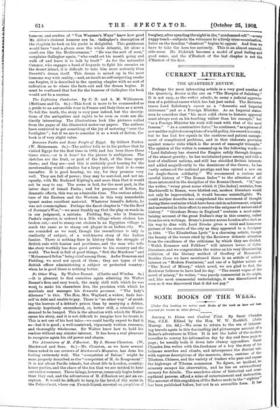C URRENT LITERAT URE.
THE QUARTERLY BEVIEW.
. Perhaps the most interesting article in a very good number of the Quarterly Review is the one on. "The Marquis of Salisbury." It is not easy, as the writer admits, to essay a judicial apprecia- tion. of a political career which has but just ended. The Reviewer traces Lord Salisbury's career as ,a "domestic and Imperial statesman" and as a Foreign Minister. As an Imperial states- man he considers that " his most solid claim to historic approval must always rest on his teaching 'rather than his example," but "as a Foreign Minister his work will rank with that of the most famous." "As a constructive force," he continues, "as a pioneer of new and far-sighted conceptions of world-policy, his record is scanty; but he has had few equals in, the cautious and patient manage- ment of complicated problems, and in that elaborate provision against remote risks which is the se3ret of unsought triumphs." The opinion of the writer is summed up in the following words :— "Lord Salisbury has steered the Empire safely through dangers of the utmost gravity ; he has maintained peace among and with a host of ebullient nations, and still has shielded British interests and added magnificently to the dominions of the Crown; he has vastly enhanced the national prestige and has opened a new era for Anglo-Saxon solidarity." We' recommend a curious and careful history of "The Roman Index" to the attention of all those interested in the discipline of the Roman Church. " If," says the writer, "every great name which it [the Index] contains, from Machiavelli to Renan, were blotted out, modern literature would not only be impoverished, it would become' unintelligible. We could neither describe nor comprehend the movement of thought during three centuries which have been rich in achievement, original and unwearied in their effort to resolve the enigmas of nature and of history." " Giordano Bruno in England" contains a most enter- taining account of the great Italian's stay in this country, culled from his own writings. Bruno's journey across London after dark on his way to dine with Lord Brooke gives a vivid and humorous picture of the streets of the city as they appeared to a foreigner in 1584. " The Elizabethan Lyric ".is a charming article, though the beauty of the verses cited by the Reviewer detracts attention from the excellence of the criticisms by which they are divided. " Welsh Romance and Folklore" will interest lovers of Celtic literature, and we congratulate the writer on his very illuminating criticism of the literary method of Geoffrey of Monmouth. Besides those we have mentioned there is an article of serious interest on "Modern Pessimism," and one of a lighter nature on "The Novel of Misery," which novel, we are glad to find, the Reviewer believes to have had its day: "The recent vogue of the novel of misery," he writes, "was purely commercial in its origin, and, like most commercial undertakings, it was discontinued as soon as it was discovered that it did not pay."










































 Previous page
Previous page